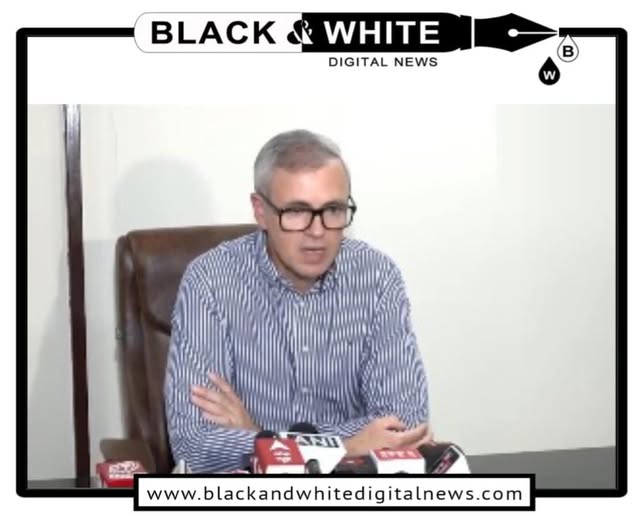Omar Draws the Line: No Water to Punjab While Jammu Thirsts, Declares CM in Fiery Rebuke.
||Black & White Digital News||
||Tejveer Singh ,June 20,2025||
JAMMU : In a bold and emotionally charged statement that has sent ripples through political and environmental corridors alike, Jammu & Kashmir Chief Minister Omar Abdullah on Friday strongly rejected a reported proposal to divert water from the union territory to neighbouring states, insisting that local needs must be met before entertaining any such plans.
Addressing a gathering in Jammu, a visibly resolute Omar Abdullah declared, “I will never permit this. Let us use our water for ourselves first… There is a drought-like situation in Jammu. Why should I send water to Punjab? Punjab already had water under the Indus Water Treaty. Did they give us water when we needed it?
His words struck a chord in the region where the signs of an emerging water crisis are already evident, dry spells have parched agricultural lands, water supply systems are under mounting pressure, and farmers stare at failing crops and uncertainty.
The flashpoint of controversy is a proposed 113-kilometre canal project which, if undertaken, would divert what is being described as ‘surplus’ water from the western rivers of the Indus system, rivers that flow through Jammu & Kashmir to the states of Punjab, Haryana, and Rajasthan.
The plan, sources say, is being mulled over as part of a larger inter-state water-sharing strategy.
However, the Chief Minister has categorically opposed the idea, framing it as both unjust and unacceptable. His passionate resistance reflects growing sentiment among people across Jammu, particularly in rural belts where monsoon delays and rising temperatures have already created a drought-like scenario. The CM’s intervention is seen not just as political posturing, but as a sincere reflection of ground realities.
“We’re not asking for anything extra. We are demanding only what is rightfully ours,” a senior official in the J&K Public Health Engineering (PHE) department told this reporter. “People in Kathua, Samba, and even parts of Jammu city are struggling to get basic water supply. Diverting our rivers now would be a betrayal to our own citizens.”
Chief Minister Omar Abdullah’s defiance also taps into a larger historical grievance, the long-standing perception that Jammu & Kashmir has often been shortchanged when it comes to resource allocation and infrastructural priorities by the central government and neighbouring states. His reference to the Indus Water Treaty, which granted much of the western river flows to Pakistan while allowing India restricted use, only reinforces this point.
Punjab has benefitted enormously from water allocations in the past. Now when we are facing an impending drought, how can anyone think of taking water away from us? This is not just policy it’s morality,” remarked a political analyst, weighing in on the statement.
On the ground, the CM’s words were met with both relief and approval from local communities. “Finally, someone is standing up for us,” said Ramesh Singh, a farmer from Bishnah. “We cannot let history repeat itself. Water is life, and our life depends on what flows through our lands, not what is taken away.”
The issue is likely to snowball into a regional flashpoint unless the centre and other states revisit the plan and consider the prevailing humanitarian concerns in J&K. Political experts believe Omar Abdullah’s statement has now compelled the Centre to re-evaluate the implications of any water-diversion plan, especially given the fragile ecological and socio-political conditions in Jammu & Kashmir.
As climate patterns shift and water wars inch closer to reality, the CM’s assertive tone underscores a fundamental truth:
you cannot draw canals out of desperation when your own people are crying out for water.
For now, Jammu stands behind Omar and the rivers, for now, remain in their natural course. But how long this stand holds against inter-state lobbying and centre-state equations remains to be seen. One thing, however, is certain — a line has been drawn, and it’s flowing with political resolve.



